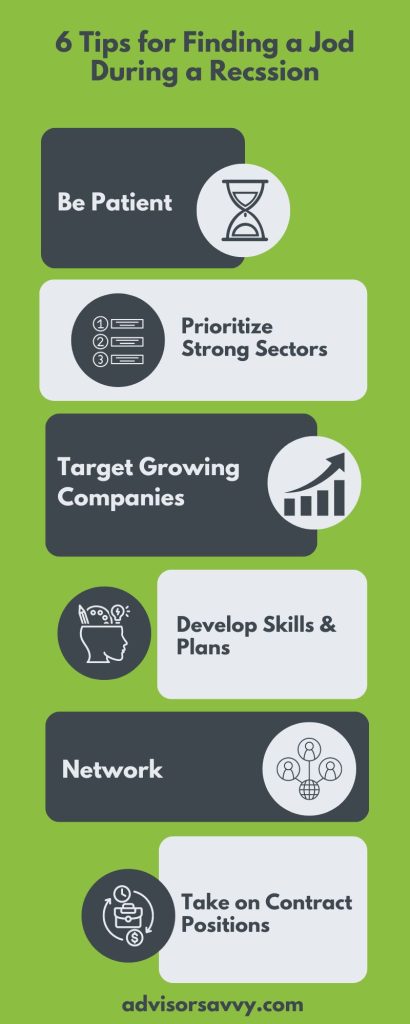
Are you worried about what you’ll do in a recession? Recessions can be scary between job loss and changes in economic climate. Lay offs occur and there are fewer employment and hiring opportunities. It does not mean it will be impossible finding a job during a recession. It just means you’ll have to be a little more diligent and practical. If you are unemployed or in a job that you are not happy in, there is hope. Recessions are not the easiest employment climates to navigate. If you do navigate it successfully you build great skills that stick with you forever. You open up, push yourself, and access your best skills and experiences. During a recession, there will be more competition for fewer positions. Continue reading to learn how to make yourself an attractive candidate despite tough economic times.

Table of contents
Who gets laid off in a recession?
It is impossible to know for certain what form a recession will take place in. Furthermore, it’s hard to know who will be safe in their job and who will lose theirs. However, using historical information, we can speculate on which hard-hit industries. Knowing this information will help you know what sectors to avoid or be wary of if you’re in it now. It will also help you identify stronger sectors to enter. Avoiding sectors experiencing layoffs is key to finding a job during a recession.
Currently, the tech industry is at the highest risk of continued layoffs. The industry has already experienced 216,328 layoffs in 2023. These layoffs have occurred in over 839 tech companies internationally. Up-to-date information on tech sector layoffs can be found at Layoffs.fyi.
High-risk employment sectors for 2023, in order of highest to lowest risk:
- Information services
- Transportation and warehousing
- Construction
- Repair, personal, and other services
- Manufacturing
- Wholesale trade
- Real estate, rental, and leasing
Medium risk employment sectors for 2023, in order of highest to lowest risk:
- Finance and insurance services
- Utilities
- Mining and logging
- Professional and business services
Low-risk employment sectors for 2023, in order of lowest to highest risk:
- The federal government (safest sector)
- Private educational services
- Healthcare and social assistance
- Accommodation and food services
- State and local government
- Retail trade
- Arts, entertainment, and recreation services
All the above information is from the Job Loss Risk Index Report. It speculates on what industries will experience the largest job loss in America. This report may mirror what is projected to happen in Canada as well. There may be differences as to what sectors are hit hardest in Canada. But again, it is challenging to know for certain what will happen during tough economic times.
Is it hard to find a job during a recession?
Job searches are always time-consuming and difficult. They become more difficult in the climate of a recession. With companies tightening budgets and reducing expenses, there are fewer job openings and less funds to pay healthy salaries. A recession is commonly described as two quarters with declining GDP growth. It is a timeframe of economic slowdown. To maintain stability companies must lay off employees and freeze hiring. There are increased challenges in a slow economy. Finding a job during a recession is one challenge but it is not impossible.

Do people get hired during a recession?
Companies continue to hire in a recession. Even Meta, Amazon, Google, and Twitter are currently hiring. These companies have had a wide number of layoffs. But with layoffs come company restructuring and positions that still need to be filled. The only issue is that there are limited positions and new jobs in this climate can be more stressful than usual. However, if you look in the right places you may find companies that are still hiring and growing.
Y-combinator and Wellfound are two websites that let you know which start-ups have recently secured funding. With funding secured, job postings are likely to follow, so get ready! Getting hired in a recession largely means looking in the right places. You need to let go of the idea of a dream company and focus on desirable roles, opportunities, and growth. Most of the known dream companies will continue to hire in reduced waves. However, they will not be ideal prospects. As job seekers will saturate their application process. Making a successful application with these companies is difficult and hard to stand out.
Is it smart to quit a job during recession?
Having work opportunities and stability in a recession are desirable needs. Stability and opportunity should be taken into consideration during a recession. However, if you are not happy in your current role, you need to consider this as well. Being unfulfilled in a job vs stability and security are always needs that should be balanced for your mental health. In a recession, if you are seeking a new job or career, this move should be made with greater planning. There are pros and cons to seeking a change of employment in a recession. Be aware of both the advantages and disadvantages. Plus, be sure to consider your own personal circumstances before moving forward.
Advantages
- Potential for increased pay
- Increased job satisfaction
- Entering a more stable job or sector
- Finding a position that meets your work/life balance needs
Disadvantages
- Fewer opportunities, possibly none
- Leaving a stable, reliable job to a sector that then lays you off
- Salary decreases, to transition
- Unknown and potentially bad work-life balance
Things to do before quitting a job
- Plan and consider what you want and need. Then examine the pros and cons of leaving a job.
- Take classes, get certificates, and take on new work projects to increase your skill set and build your resume.
- Seek jobs in stable employment sectors.
- Work on your resume, apply to jobs, and interview.
The HR Digest has a full article on knowing when to quit your job in a recession.
Tips for Finding a Job During a Recession
If you’re ready to face the challenge of finding a job during a recession, consider these tips below. With dedication and strategy, you have a great chance of finding a job!
1. Be Patient
Job searches can be easier in times of prosperity because there’s so much choice. In a recession, you need to offer yourself additional patience. Fewer opportunities and more people are looking for work. Take your time searching for work. Consider fields or positions you would not normally think of; keep an open mind. Figure out ways to make yourself stand out as a candidate. Being flexible and creative with your job search are things you can control. Allow yourself the time to do so. If you are in a crunch financially become inventive with the ways you can earn money and use your emergency fund. This will help you in building new skills.
2. Prioritize strong sectors
Some industries offer more stability than others. Highlight your transferable skills to enter a strong, stable, and growing industry. Some of the industries that experience relative stability during a recession are the federal government, educational services, healthcare and social assistance, and provincial and local government. Be flexible about what industry you enter and apply to. This can increase your options and success rate. However, do not sell yourself short, apply for jobs you may be underqualified for. This could be your gateway to a better job.
3. Find and target growing companies
Focus less on a job title or position. Find companies that are experiencing growth in a recession. Then, target your attention to them. These companies will offer more growth and opportunity over time. Being employed by a growing company offers stability and security. Y-combinator and Wellfound are two websites that let you know which start-ups have recently secured funding. This is a sign of future growth.
4. Improve your resume, develop skills and plan
Draw on experiences that offer the best transferable skills. Highlighting this on a resume will make you more valued. Especially in sectors and companies, you have never worked in. If you are noticing gaps in your resume for the type of job you want. Enroll in a class and develop the necessary skills to include on your resume. If you are employed, seek new projects with your current employer. These projects can highlight initiative, project management, and leadership skills. Developing as many transferable skills as possible is important. It is best if you do your research on the fields you’d like to enter. This will allow you to design a path to the field you would like. In a recession, tailor your resumes and cover letters for each job. This is important in making yourself stand out.
5. Network
Networking sounds like a big and scary skill set or task. It is not. Let past colleagues, family and friends know you are seeking new opportunities. Ask about where they are with their job and employer. Ask if they feel it is a good fit for them and if there are any opportunities, they’d believe would be a good fit for you. This could result in referrals to jobs, which lead to more successful applications.
Ask individuals how they found their job. Start a conversation on how they transitioned into their role. This is a great networking strategy. It allows you to learn about what you must do. It also shows others you are willing to do what you must to transition and find work. They become more open to assisting you in your job search. Although, there may not be immediate job openings. However, you have now left yourself fresh in people’s minds for future opportunities.
A scarier aspect of networking is reaching out to companies you admire. This could take the form of reaching out to hiring managers or finding someone in a role you admire. Ask them for insights into the company’s hiring process. What the company looks for and what credentials may help you stand out in an application. Networking is much more difficult with individuals you don’t know. People are always willing to help when they can, and many are flattered you are reaching out for advice.
Related Reading: The Best Finance Industry Events and Conferences in Canada
6. Take on contract positions, part-time work or offer freelance services
Ideally, full-time, stable, and secure work is the goal in a recession. However, taking on a contract, part-time work or offering freelance services could help financially. This will give you additional time while searching for a new job. Doing any of these things will also help you develop new and important skills. Being resourceful and open to any opportunity in a recession is important. Taking a class may not be economically feasible. However, doing work you are capable of but have had no experience with shows skill development. Contracts, part work, and freelance opportunities are a great way to develop skills. They additionally help you earn money.
Related Reading: What to Know About Being Self-Employed
Other Resources Available
While you are searching for a job in a recession you may not have the financial resources you need to get by. There are other options:
- If you have been laid off you may be eligible for Employment Insurance (EI) benefits.
- You must have lost your job at no fault of your own (you cannot have quit).
- Must have been employed through an insured employer and have insurable hours.
- If you have been laid off, or are in the process of lay off, try to negotiate severance pay.
- Asking friends and family for financial support.
- Freelance work on fiver or another platform.
- Odd jobs, through word of mouth, Kijiji, or Craigslist.
- Selling collectables, old clothing you no longer wear, books or other belongings.
Related Reading: How To Make Extra Money Online In Canada
Is it good to get a new job during a recession?
Finding a new job during a recession can have its challenges. It also has its pros and cons. If you are jobless, it is important to find work to maintain your personal finances. Finding work during a recession will help you develop many job-searching skills. These skills will stay with you. While searching for a job during a recession imposes difficulties, there are positives.
If you are seeking new work, makes sure you create a plan before leaving your old work. Especially in a recession. Ultimately it is good to get a job in a recession if you need one or are unhappy in your current role. Prioritize stability and security during a recession. Finding a job during a recession is not impossible. However, it is something that needs to be approached with intention.

